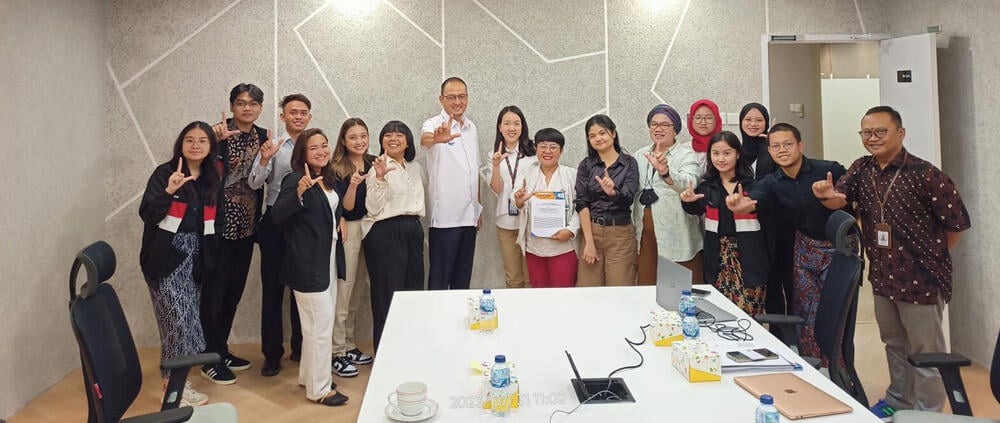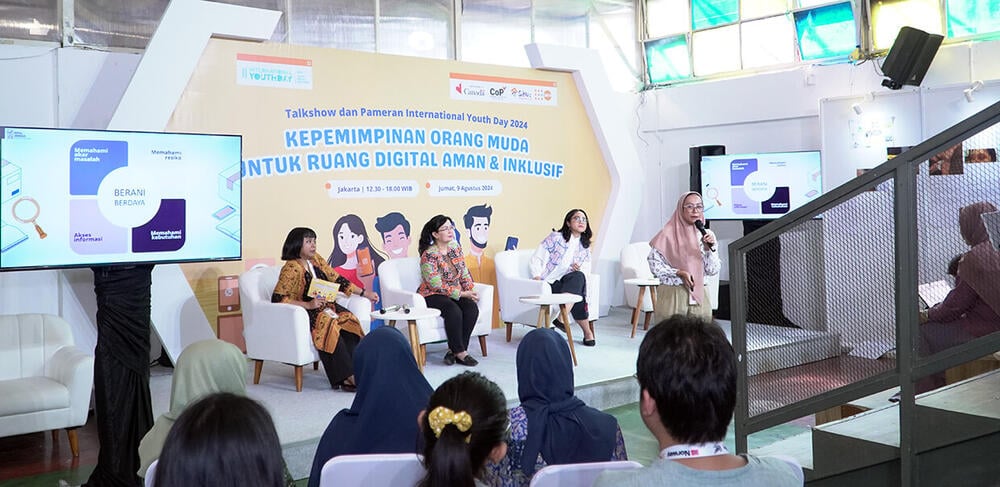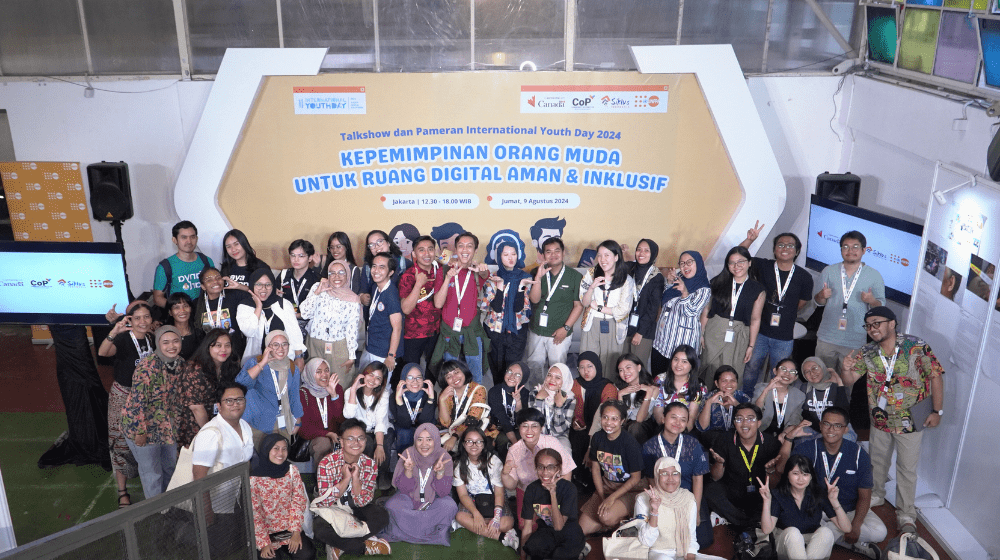Despite the internet's ubiquity, the digital space has not been safe for women and young people in Indonesia. Eleven percent of women aged 15-49 years old admitted to have experienced technology-facilitated gender-based violence (TFGBV) since age 15 (National Women’s Life Experience Survey, 2021). In 2023, TFGBV became the most reported case of violence in public spaces, where 967 cases were found to target students (Annual Notes On Violence Against Women, 2023).
In response to the phenomenon, the 2024 International Youth Day focuses on “Youth Leadership for Safe and Inclusive Digital Spaces.” While technology offers opportunities for education, employment, and civic participation, it can also exacerbate digital divides and expose young people, especially adolescent girls, to increased risks of gender-based violence. Young people have been impacted, but at the same time, have led efforts to end TFGBV and make digital spaces safer and more inclusive.
Content creators leading advocacy for digital rights and bodily autonomy
“Imagine you are a 21-year-old girl receiving hate speech from people you don’t even know, because your ex-boyfriend shared your intimate images on social media and group chats,” said D. Anisa (Danisa) Sunija, Coordinator of Mitra Citra Remaja, a youth center of Indonesian Planned Parenthood Association (PKBI) West Java. “That’s the story of our client, X, a college student who became a victim of non-consensual intimate image sharing upon her breakup,” she continued. Perpetuity is one of the unique characteristics of TFGBV, as images and digital materials used to perpetrate abuse are likely to exist indefinitely or for long periods of time.
Another prevalent type of TFGBV is cyberstalking, which involves activities that follow, monitor, and harass someone online. Tabu.id, a popular Instagram account which produces sexual and reproductive health information for youth, also became the target of cyberstalking. “Some of our followers on social media received direct messages from an anonymous account who claimed to find their usernames from Tabu.id’s comment section,” said Daniel Wahyu, Co-Lead for Public and Strategic Communication at Tabu.id. “The sender then started to bombard them with pornographic messages to harass them,” he added.
Daniel and Danisa are both members of the Community of Practice (CoP) for sexual reproductive health youth content creators, a network established and facilitated by UNFPA Indonesia and Siklus Indonesia since mid-2020. In the span of four years, the CoP has evolved from a circle of 20 content creators spreading accurate information on COVID-19 during the pandemic, to a national network of 77 youth-led platforms and content creators from 12 provinces in Indonesia with a total reach of more than 900,000 young people. CoP members actively campaign on gender equality and sexual and reproductive health, including the prevention of TFGBV, across various social media platforms like Instagram, TikTok, and Youtube.
Meaningful youth participation is the core spirit in the CoP, as youth content creators are co-partners and co-designers of the CoP initiatives. The governance, structure, decision-making processes, activities, training, and campaigns initiated in the CoP are designed collaboratively with all members.

Knowing that TFGBV is one of the emerging issues identified by the CoP members, in 2023, the CoP has collaboratively developed a policy brief titled “Sudahkah Ekosistem Digital Aman dan Inklusif bagi Orang Muda Mengakses Informasi Kesehatan Seksual dan Reproduksi?” which in English translates to “Is the Digital Ecosystem Safe and Inclusive for Young People to Access Sexual and Reproductive Health Information?”
The policy brief emphasizes the vulnerability of young people, especially SRH content creators, to online risks like TFGBV. It calls for government action to enhance digital security and collaborate with various stakeholders to promote digital literacy and awareness of TFGBV risks. The brief was well-received by the Ministry of Communication and Information and the Ministry of Health, leading to planned collaborative efforts to raise awareness about TFGBV through joint content creation, video production, and public events.
International Youth Day 2024, a Momentum to Illuminate Youth Leadership on Digital Spaces
To celebrate International Youth Day 2024, a public talk show on "Youth Leadership for Safe and Inclusive Digital Spaces" was held by UNFPA and Siklus Indonesia, in collaboration with the CoP. The event, involving 115 youth participants and key stakeholders, highlighted the urgent need for collaborative efforts to create a safe and violence-free digital space, as social media accounts have become integral to young people's lives.

A strong commitment from government, law enforcement, and educational leaders is needed to create a safe environment free from violence,
“Tackling TFGBV cases is not straightforward. We already have the Law on Sexual Violence, but ensuring law enforcement shares the same perspective in handling these cases is crucial," said Firda Ainun from Rifka Annisa Women Crisis Centre, who is also a CoP member. “A strong commitment from government, law enforcement, and educational leaders is needed to create a safe environment free from violence,” Firda added.
During the event, UNFPA Indonesia Champion Ayu Saraswati also called attention to the gravity of TFGBV, “Digital violence is real violence. It is a violation of human rights and bodily autonomy that negatively impacts the psychological, emotional and physical condition of victims.” She invited participants to join the Bodyright campaign, a social movement to create a safe digital world with ‘copyright’ for the body shown in the picture.
Moving forward, UNFPA will continue supporting youth leadership within the CoP to advocate for TFGBV prevention and response. CoP are currently collaborating with ICT Watch to develop a comprehensive guideline for content creators to mitigate TFGBV risks and raise awareness. UNFPA is also assisting the Ministry of Women's Empowerment and Child Protection to strengthen GBV service providers' capacities in responding to TFGBV, ensuring comprehensive support for victims.
To tackle TFGBV, I believe it is important to equip youths with information about sexual reproductive health and prevention of gender-based violence,
“To tackle TFGBV, I believe it is important to equip youths with information about sexual reproductive health and prevention of gender-based violence,” said Danisa, Coordinator of Mitra Citra Remaja, in the International Youth Day 2024 panel talk show. “Joining CoP has helped me to understand how I can support the TFGBV survivors by connecting them with technology solutions, legal aid, and psychological services,” Danisa added.
Through collaborative initiatives, youth-led content creation, and strategic partnerships, the CoP is contributing to create safer digital spaces for all. By empowering young people with knowledge and resources, and advocating for stronger government action, the CoP aims to lead the charge towards a future where technology is facilitating empowerment, not gender-based violence.
—
Giasinta Livia
Youth Engagement, Digital Health, and Innovation Focal Point, UNFPA Indonesia


